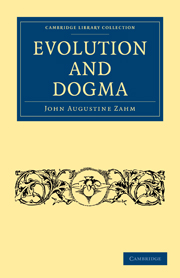Book contents
- Frontmatter
- PREFATORY NOTE
- Contents
- INTRODUCTION
- PART I EVOLUTION, PAST AND PRESENT
- CHAPTER I NATURE AND SCOPE OF EVOLUTION
- CHAPTER II EARLY EVOLUTIONARY VIEWS
- CHAPTER III FOSSILS AND GIANTS
- CHAPTER IV SPONTANEOUS GENERATION AND SCIENTIFIC DISCOVERY
- CHAPTER V FROM LORD BACON TO CHARLES DARWIN
- CHAPTER VI CONTROVERSY AND PROGRESS
- CHAPTER VII EVIDENCES OF EVOLUTION
- CHAPTER VIII OBJECTIONS AGAINST EVOLUTION
- PART II EVOLUTION AND DOGMA
- AUTHORS AND WORKS CITED IN “EVOLUTION AND DOGMA.”
- GENERAL INDEX
CHAPTER VI - CONTROVERSY AND PROGRESS
Published online by Cambridge University Press: 29 August 2010
- Frontmatter
- PREFATORY NOTE
- Contents
- INTRODUCTION
- PART I EVOLUTION, PAST AND PRESENT
- CHAPTER I NATURE AND SCOPE OF EVOLUTION
- CHAPTER II EARLY EVOLUTIONARY VIEWS
- CHAPTER III FOSSILS AND GIANTS
- CHAPTER IV SPONTANEOUS GENERATION AND SCIENTIFIC DISCOVERY
- CHAPTER V FROM LORD BACON TO CHARLES DARWIN
- CHAPTER VI CONTROVERSY AND PROGRESS
- CHAPTER VII EVIDENCES OF EVOLUTION
- CHAPTER VIII OBJECTIONS AGAINST EVOLUTION
- PART II EVOLUTION AND DOGMA
- AUTHORS AND WORKS CITED IN “EVOLUTION AND DOGMA.”
- GENERAL INDEX
Summary
Darwin's “Origin of Species.”
THE culmination of all the tentative efforts which had hitherto been made, towards giving a rational explanation of the mode of production of the divers species of our existing fauna and flora, was in the publication of Darwin's now famous work, “The Origin of Species,” which was given to the world in 1859. Simultaneously and independently another naturalist, Mr. Alfred Wallace, who was then far away in the Malay Archipelago, had come to the same conclusions as Darwin. For this reason he is justly called the co-discoverer of the theory which has made Darwin so famous.
The publication of “The Origin of Species” was the signal for a revolution in science such as the world had never before witnessed. The work was violently denounced or ridiculed by the majority of its readers, although it counted from the beginning such staunch defenders as Huxley, Spencer, Lyell, Hooker, Wallace, and Asa Gray. Professor Louis Agassiz, probably the ablest naturalist then living, in his criticism of the book declared: “The arguments presented by Darwin, in favor of a universal derivation from one primary form of all the peculiarities existing now among living beings, have not made the slightest impression on my mind. Until the facts of nature are shown to have been mistaken by those who have collected them, and that they have a different meaning from that now generally assigned to them, I shall therefore consider the transmutation theory as a scientific mistake, untrue in its facts, unscientific in its method, and mischievous in its tendency.”
- Type
- Chapter
- Information
- Evolution and Dogma , pp. 65 - 83Publisher: Cambridge University PressPrint publication year: 2009First published in: 1896



